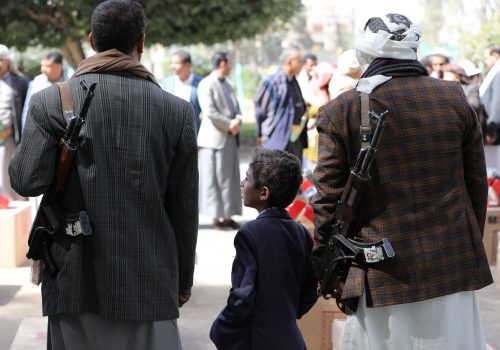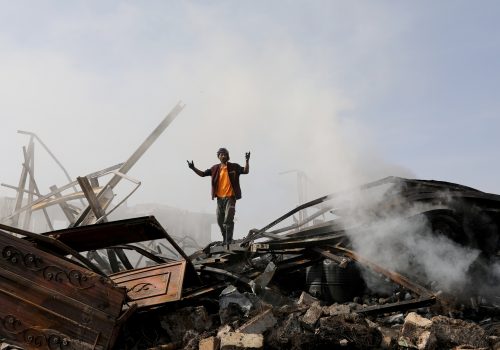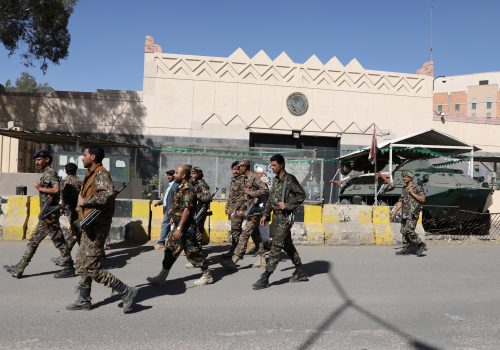Russia is friendly with the Houthis in Yemen. But it’s complicated.
Russia has played a very different role in the conflict in Yemen than it has in Syria and Libya. In Syria, Moscow has joined forces with Iran and its various Shia militia allies to defend the Bashar al-Assad regime against its opponents. In Libya—a conflict that Iran appears to be largely uninvolved in—Moscow has sent private military forces from the Wagner Group to support groups backed by Iran’s rivals—Egypt and the United Arab Emirates (UAE)—in eastern Libya. By contrast, Russia has not become militarily involved in the conflict in Yemen where Iran is supporting one group—the Houthi rebels—while Iran’s adversaries—Saudi Arabia and the UAE—are supporting their opponents. However, even though Moscow may not be militarily involved in Yemen does not mean that Russia is uninvolved.
Yemen was riven by internal conflict even before its 2011 uprising that resulted in the country’s longtime president, Ali Abdullah Saleh, handing power to his vice president, Abdrabbuh Mansur Hadi, in a Gulf Cooperation Council-sponsored transition in February 2012. A multi-sided civil war soon erupted, involving the Saudi-backed Hadi government, the Iran-backed Houthis in Yemen’s far north, former president Saleh, the UAE-backed Southern Transitional Council—seeking the restoration of South Yemen’s independence, which had lasted from 1967 to 1990—al-Qaeda in the Arabian Peninsula, and the Islamic State of Iraq and al-Sham. With the exception of the two Sunni jihadist groups, Moscow has engaged with all the internal protagonists and the three main regional powers involved in the conflict: Saudi Arabia, the UAE, and Iran. Indeed, Moscow’s engagement with the various Yemeni factions supported by Riyadh, Abu Dhabi, and Tehran can be seen as part of Russia’s broader effort to build and maintain good relations with the Kingdom and the UAE on the one hand and the Islamic Republic—despite their mutual antagonism.
Russia has long called for an internal Yemeni dialogue to bring about an end to the conflict and has offered its services as a mediator. The Russian Foreign Ministry has also received Yemenis from different factions in Moscow. Russian observers like to point out the relative success of Moscow’s intervention in Syria compared to Riyadh’s in Yemen while portraying Russia as playing an even-handed, peace-seeking role in Yemen. Despite this, the United States, as well as Arab Gulf governments, are concerned about Moscow’s friendly ties with the Iran-backed Houthis.
The US, United Kingdom, France, and several other countries withdrew their embassies from Sanaa in 2015 after the Houthis took over the Yemeni capital in September 2014. By contrast, Russia maintained its embassy there until December 2017. In April 2015, Russia was the only member of the United Nations Security Council (UNSC) to abstain on Resolution 2216, which imposed an arms embargo on the Houthis and a travel ban on its leader. Three years later, in February 2018, Russia vetoed a UNSC resolution extending the arms embargo against the Houthis, which blamed Iran for violating it. Moscow also opposed the Donald Trump administration’s designation of the Houthis as a foreign terrorist organization and has instead called for an inclusive intra-Yemeni peace process like Tehran has done. Russia also reportedly toned-down criticism of the Houthis in the March 18 UNSC press statement on Yemen.
Despite all this, Moscow has shown a lack of support and even disagreed with the Houthis on several occasions. In December 2017, Russian Foreign Minister Sergey Lavrov criticized the rebels for having killed former President Saleh—who had allied with them after his ouster only to break ties with the group in December 2017, days before his death—and described the Houthis as having become “radicalized.” After vetoing the UNSC resolution that extended the arms embargo against the Houthis and was critical of Iran, Moscow proposed another resolution which passed (UNSC Resolution 2402) that extended the arms embargo against the Houthis but did not criticize Iran for arming them. In other words, Moscow was more interested in protecting Iran than the Houthis. In addition, as Dr. Samuel Ramani of Oxford University has pointed out, “Russia has repeatedly refused to establish commercial relations with the Houthis and ignored their petitions for a diplomatic intervention on their behalf.” In March, Lavrov described Houthi attacks on Saudi oil facilities as “unacceptable” at a joint press conference in Riyadh with the Saudi foreign minister.
Unlike in Syria, where Russia and Iran support the Assad regime, Moscow is not backing the Houthis to the same extent that Iran is in Yemen. On the other hand, Russia’s actions also indicate that it does not see a resolution to the conflict in Yemen if it does not include the Houthis either. But beyond proposing intra-Yemeni dialogue, Moscow does not seem to have any concrete plan for ending the civil war. Instead, Moscow’s treatment of the Houthis as a legitimate Yemeni actor—and its criticism of the movement and support for the continued arms embargo against it—seems designed to keep all internal and external actors guessing about what the Kremlin might do next, thus, providing them all with an incentive to court Moscow in the hope of gaining its favor. In other words, what Moscow seems to want is to remain on good terms with all external and non-jihadi internal parties as long as the Yemen conflict continues and for Russia to be in a position to influence its resolution, however unlikely that prospect appears to be at present.
Mark N. Katz is a nonresident senior fellow at the Atlantic Council. He is also a professor of government and politics at the George Mason University Schar School of Policy and Government.
Image: Russia's Prime Minister Vladimir Putin (R) and Yemen's President Ali Abdullah Saleh meet in Moscow for talks February 24, 2009. REUTERS/Alexander Natruskin



